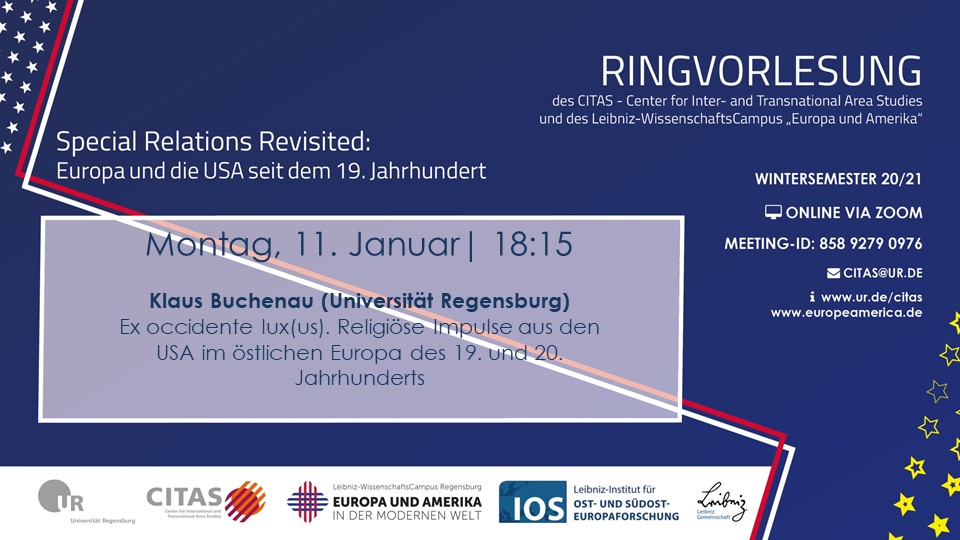Lecture Series: Religiöse Impulse aus den USA im östlichen Europa des 19. und 20. Jahrhunderts (Klaus Buchenau)
In his lecture for the "Special Relations Revisited" series Klaus Buchenau explores religious entanglements between Eastern Europe and the US in the 19th and 20th centuries. This lecture will be held in German.
Ex occidente lux(us). Religiöse Impulse aus den USA im östlichen Europa des 19. und 20. Jahrhunderts
Im 19. Jahrhundert setzte eine massive Auswanderung aus dem östlichen Europa in die USA ein, mit weitreichenden und teils unvorhergesehenen Folgen. Am religiösen Migrationsgeschehen wird sichtbar, dass die Westwanderung - auf verschlungenen Wegen - eine „Veröstlichung“ der religiösen Sphäre im nördlichen Karpatenraum nach sich zog. Menschen, die in habsburgischer Zeit von der Orthodoxie getrennt und über die Union mit Rom dem westlichen Christentum zugeführt worden waren, nutzten die amerikanische Religionsfreiheit zur Wiederentdeckung ihrer orthodoxen Wurzeln. Schließlich brachten sie ihr finanzielles und kulturelles Kapital ein, um in der alten Heimat eine äußerst erfolgreiche Missionsbewegung anzustoßen, in deren Folge Hunderttausende sich in der Ostslowakei und der Karpatenukraine der Orthodoxie zuwandten. Derartige Verflechtungen sind auch heute wieder von Bedeutung - wie etwa das Beispiel orthodoxer Theologie „made in USA“ in der Ukraine zeigt.
Ex occidente lux(us): US Religious Influences in Eastern Europe in the nineteenth and twentieth centuries
Large-scale emigration from Eastern Europe to the US took place in the nineteenth century, a process that had far-reaching and often unforeseeable consequences. The impact of migration on religion is explored here to show that westward migration actually led, in a rather complex way, to the "easternization" of the religious sphere in the Northern Carpathian region. People who in the Habsburg Empire had been separated from the Orthodox Church and via the Union of Rome had been brought closer to Western Christendom used US-American religious freedoms to rediscover their Orthodox roots. Ultimately, they invested their financial and cultural capital in order to initiate an exceptionally successful missionary movement in their former homelands. This resulted in hundreds of thousands of people in Eastern Slovakia and Carpatho-Ukraine turning to Orthodoxy. Such entanglements are again important today, as evident in the case of the impact of "Made in the USA" Ortohdoxy theology in today's Ukraine.
Klaus Buchenau has been professor of Southeast and European history at UR since 2013. His research interests include exploring the history of Serbia and Croatia comparatively in the context of religion, culture, and informality and corruption. He is currently working on a history of the noble Thurn and Taxis Family in former Yugoslavia.
Klaus Buchenau ist seit April 2013 Professor für Geschichte Südost- und Osteuropas an der Universität Regensburg. Zu seine Forschungsinteressen gehörten u.a. vergleichende serbisch-kroatische Geschichte mit Bezug auf Informalität und Korruption, wie auch Orthodoxie und Katholizismus, und die Geschichte der adligen Familie Thurn-und-Taxis in ehem. Jugoslawien.
When? Monday, 11 January 2021, 18:15
Where? Online via Zoom, https://uni-regensburg.zoom.us/j/85892790976, Meeting ID: 858 9279 0976
The lecture series "Special Relations Revisited: Europa und die USA seit dem 19. Jahrhundert" investigates how transatlantic relations have changed over the past 200 years. It is organized together with CITAS. Find the full programm here.

